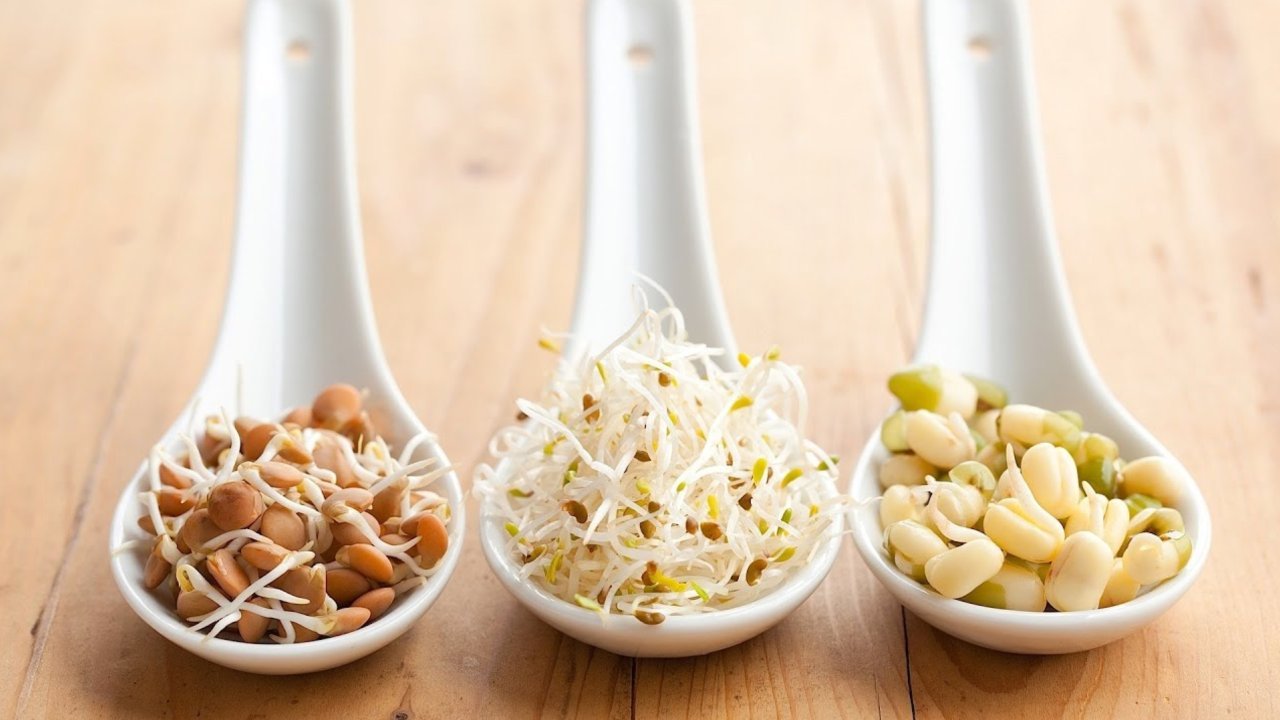Benefits of Eating Sprouts Daily for Women
Sprouts are young, germinated seeds of vegetables, legumes, or grains. They are a nutritional powerhouse, packed with vitamins, minerals, and antioxidants. Sprouts are considered a highly nutritious food due to their high concentration of nutrients compared to their mature counterparts.
During the germination process, the seeds undergo a series of biochemical changes that result in the production of enzymes, vitamins, and minerals. These nutrients are readily available for absorption by the body, making sprouts a highly bioavailable food source. Additionally, sprouting can increase the levels of certain nutrients, such as vitamin C, folate, & vitamin K.
Sprouts are also a good source of fiber, which can help promote digestive health and regulate bowel movements. The fiber in sprouts can also help to keep you feeling full and satisfied, which can aid in weight management.
Common Types of Sprouts:
Sprouts offer a diverse range of nutritional benefits depending on their type. From bone-boosting alfalfa sprouts to cancer-fighting broccoli sprouts, each variety provides unique advantages for your health. Some of the details are below.
1. Alfalfa Sprouts:
- Description: Tiny, delicate sprouts with a mild, nutty flavor.
- Uses: Often used in salads, sandwiches, and wraps.
- Nutritional Highlights: Rich in vitamins A, C, and K, and a good source of fiber.
2. Mung Bean Sprouts:
- Description: Crisp and crunchy sprouts with a slightly nutty taste.
- Uses: Popular in Asian cuisine, used in stir-fries, salads, and soups.
- Nutritional Highlights: High in protein, vitamins C and K, and antioxidants.
3. Broccoli Sprouts:
- Description: Small, green sprouts with a mild broccoli flavor.
- Uses: Added to salads, sandwiches, or blended into smoothies.
- Nutritional Highlights: Known for high levels of sulforaphane, a compound with potential cancer-fighting properties.
4. Radish Sprouts:
- Description: Peppery and spicy sprouts with a tangy flavor.
- Uses: Great for adding a zesty kick to salads and sandwiches.
- Nutritional Highlights: Rich in vitamins A, C, and antioxidants.
5. Lentil Sprouts:
- Description: Mildly nutty sprouts with a crunchy texture.
- Uses: Can be used in salads, soups, or as a garnish.
- Nutritional Highlights: High in protein, fiber, and several B vitamins.
6. Chickpea Sprouts:
- Description: Nutty, slightly sweet sprouts with a firm texture.
- Uses: Suitable for salads, stews, and wraps.
- Nutritional Highlights: Rich in protein, fiber, and essential minerals like iron and magnesium.
Sprouts are often used in salads, sandwiches, and stir-fries, adding a fresh, crunchy texture and a burst of flavor. They can also be consumed raw, cooked, or fermented.
Nutritional Profile of Sprouts
1. Vitamins: Sprouts are packed with essential vitamins, including:
- Vitamin A: Supports vision, immune function, and skin health. Sprouts are particularly high in beta-carotene, a precursor to vitamin A, which is beneficial for eye health.
- Vitamin C: Boosts immunity, aids in iron absorption, and promotes collagen production. Sprouts are a great source of vitamin C, especially when consumed fresh.
- Vitamin K: Essential for blood clotting and bone health. Sprouts, especially broccoli sprouts, are rich in vitamin K, which is crucial for bone health and blood clotting.
- B vitamins: Supports energy production, brain function, and red blood cell formation. Sprouts contain a variety of B vitamins, including folate, thiamine, riboflavin, and niacin, which are essential for overall health and well-being.
2. Minerals: Sprouts are a good source of essential minerals, such as:
- Iron: Necessary for oxygen transport in the blood. Sprouts, especially alfalfa sprouts, are a good source of iron, which is essential for preventing anemia.
- Calcium: Vital for bone health and muscle function. Sprouts, such as broccoli sprouts and radish sprouts, contain calcium, which is important for strong bones and teeth.
- Magnesium: Involved in numerous bodily functions, including energy production, muscle and nerve function, and blood pressure regulation. Sprouts are a good source of magnesium, which is essential for many bodily functions.
- Potassium: Helps regulate blood pressure and fluid balance. Sprouts, especially alfalfa sprouts, are a good source of potassium, which is important for maintaining healthy blood pressure.
3. Antioxidants: Sprouts contain antioxidants, such as flavonoids and carotenoids, that help neutralize harmful free radicals, protecting cells from damage. Sprouts are particularly high in antioxidants, which can help protect against chronic diseases such as heart disease and cancer.
Top 8 Health Benefits of Sprouts
Sprouts are a nutritional powerhouse, offering a wide range of health benefits. Packed with vitamins, minerals, and antioxidants, they support digestion, immunity, and overall well-being. Below are some of its benefits.
1. Digestive Health
- Enzymes: Sprouts contain enzymes that can aid in digestion and nutrient absorption, helping to break down food and improve overall digestive function. For example, sprouts contain amylase, which breaks down carbohydrates, and protease, which breaks down proteins.
- Fiber Content: The high fiber content in sprouts supports healthy digestion and regular bowel movements, preventing constipation and promoting gut health. Fiber can also help to feed beneficial gut bacteria, which play a crucial role in digestive health.
2. Immune Support
- Vitamins and Minerals: The abundance of vitamins C and A, along with other essential nutrients in sprouts, helps boost the immune system, making it better equipped to fight off infections and diseases. For example, vitamin C is a powerful antioxidant that helps protect cells from damage and supports the production of white blood cells, which are essential for fighting infections.
- Antioxidants: Sprouts are packed with antioxidants that help combat oxidative stress, a process that can damage cells and weaken the immune system. These antioxidants include flavonoids, carotenoids, and vitamin E, which can help protect against chronic diseases such as heart disease and cancer.
3. Weight Management
- Low Calorie: Sprouts are a low-calorie food option, making them a great addition to a balanced diet for weight management. They are also high in volume, meaning you can eat a large quantity without consuming too many calories.
- Satiety: The high fiber content in sprouts can promote feelings of fullness, reducing overeating and helping to control calorie intake. Fiber can also help to slow down digestion, leading to a feeling of fullness for a longer period of time.
4. Blood Sugar Regulation
- Low Glycemic Index: Sprouts generally have a low glycemic index, meaning they are digested slowly and do not cause a sudden spike in blood sugar levels. This can help to prevent blood sugar spikes and crashes, which can contribute to weight gain and other health problems.
- Nutrient-Dense: The high nutrient content of sprouts helps manage blood sugar levels by providing essential nutrients and supporting overall metabolic health. For example, chromium, a trace mineral found in sprouts, can help improve insulin sensitivity, which is important for regulating blood sugar levels.
5. Heart Health
- Healthy Fats: Some sprouts, such as flaxseed sprouts, contain beneficial fats like omega-3 fatty acids, which can support cardiovascular health. Omega-3 fatty acids can help reduce inflammation, lower blood pressure, and improve cholesterol levels.
- Antioxidants: The antioxidants and anti-inflammatory compounds found in sprouts can help reduce the risk of heart disease by protecting the heart from damage and reducing inflammation. For example, flavonoids found in sprouts can help to reduce the risk of blood clots and improve blood flow.
6. Skin Health
- Nutrients for Skin: Vitamins A and C, both abundant in sprouts, are beneficial for skin health. Vitamin A supports cell growth and repair, while vitamin C promotes collagen production, which is essential for healthy skin. These nutrients can help to improve skin elasticity, reduce wrinkles, and promote a healthy glow.
- Hydration: Some sprouts, such as cucumber sprouts, can contribute to skin hydration, helping to keep the skin supple and youthful. Hydration is important for maintaining healthy skin and preventing dryness and premature aging.
7. Detoxification
- Detoxifying Compounds: Certain sprouts, such as broccoli sprouts, contain compounds that can help detoxify the body by supporting liver function and removing harmful toxins. For example, broccoli sprouts contain sulforaphane, a compound that can help to activate enzymes that detoxify the liver.
8. Bone Health
- Calcium and Vitamin K: The presence of calcium and vitamin K in sprouts is essential for maintaining strong bones and preventing osteoporosis. These nutrients work together to improve bone density and reduce the risk of fractures. Calcium is essential for building and maintaining bone tissue, while vitamin K helps to regulate calcium metabolism.
Types of Sprouts and Their Specific Benefits
Sprouts offer a diverse range of nutritional benefits depending on their type. From bone-boosting alfalfa sprouts to cancer-fighting broccoli sprouts, each variety provides unique advantages for your health. Below are a few of them.
Alfalfa Sprouts
- Rich in vitamins and minerals: Alfalfa sprouts are packed with vitamins like vitamin C, folate, and vitamin K, as well as minerals like calcium, iron, and magnesium. These nutrients are essential for various bodily functions, including immune health, cell growth and repair, and bone health.
- Supports bone health and digestion: The calcium and vitamin K in alfalfa sprouts contribute to strong bones, while the fiber content aids in digestion and promotes gut health. Fiber can also help to prevent constipation and maintain a healthy weight.
Mung Bean Sprouts
- High in protein and antioxidants: Mung bean sprouts are a good source of plant-based protein and antioxidants, which can help support weight management and overall health. Protein is essential for building and repairing tissues, while antioxidants can help protect cells from damage caused by free radicals.
- Aids in weight management and blood sugar control: The protein and fiber in mung bean sprouts can help you feel full and satisfied, reducing overeating and helping to manage blood sugar levels. This can be particularly beneficial for individuals with diabetes or who are trying to lose weight.
Broccoli Sprouts
- Contain sulforaphane: Broccoli sprouts are particularly known for their high concentration of sulforaphane, a compound that has been studied for its potential cancer-fighting properties. Sulforaphane can help to activate enzymes that detoxify the body and protect cells from damage.
- Supports liver health and detoxification: In addition to its potential cancer-fighting properties, sulforaphane can also help to support liver health and detoxification. The liver is responsible for filtering toxins from the blood, and sulforaphane can help to improve its function.
Radish Sprouts
- Help with digestion: Radish sprouts are a great source of fiber, which can help improve digestion and prevent constipation. Fiber can also help to promote the growth of beneficial gut bacteria, which are essential for overall digestive health.
- Have anti-inflammatory benefits: Certain compounds in radish sprouts have been shown to have anti-inflammatory properties, which can help reduce inflammation in the body. Inflammation is linked to a variety of health problems, including heart disease, arthritis, and digestive disorders.
How to Incorporate Sprouts into Your Diet
Sprouts are incredibly versatile and can be easily added to various dishes. Here are some popular ways to incorporate sprouts into your daily diet:
Salads
- Add a crunchy texture: Sprouts add a delightful crunch and freshness to any salad. Try adding alfalfa sprouts to a spinach salad with strawberries and balsamic vinaigrette, or mix mung bean sprouts with shredded carrots and a light lemon dressing.
Sandwiches and Wraps
- Healthy, crunchy addition: Sprouts can add a burst of flavor and nutrition to sandwiches and wraps. Include radish sprouts in a grilled cheese sandwich, or add broccoli sprouts to a chicken wrap with hummus and avocado.
Smoothies
- Blend into smoothies for added nutrients: Sprouts can be blended into smoothies to boost their nutritional content. Try blending spinach sprouts with banana, almond milk, and a scoop of protein powder for a nutritious and refreshing smoothie.
Soups and Stews
- Stir into soups or stews for extra nutrition: Sprouts can be added to soups and stews towards the end of cooking to preserve their nutrients and maintain their fresh texture. Consider adding lentil sprouts to a hearty vegetable soup or chickpea sprouts to a spicy curry.
Remember: When incorporating sprouts into your diet, it’s important to rinse them thoroughly before consuming to remove any potential bacteria. Additionally, it’s best to consume sprouts within a few days of sprouting for optimal freshness and nutritional value.
Tips for Safety and Storage of Sprouts
Hygiene:
- Thorough washing: Always wash sprouts thoroughly with cold running water to remove any dirt, bacteria, or contaminants.
- Avoid cross-contamination: Use separate cutting boards and utensils for handling sprouts to prevent cross-contamination from other foods.
Storage:
- Refrigerate: Store sprouts in a sealed container in the refrigerator to maintain freshness.
Avoid moisture: Ensure the container is dry to prevent mold growth.
Consume promptly: While refrigerated, sprouts should be consumed within a few days of purchase or sprouting to minimize the risk of spoilage.
Consumption:
- Avoid raw sprouts during pregnancy: Pregnant women should avoid consuming raw sprouts, as they may be contaminated with harmful bacteria, such as Listeria.
- Cook sprouts thoroughly: If you have concerns about food safety, cooking sprouts can help reduce the risk of bacterial contamination.
- Listen to your body: Pay attention to any digestive symptoms after consuming sprouts. If you experience discomfort, it’s best to avoid them in the future.
By following these safety guidelines, you can enjoy the benefits of sprouts while minimizing the risk of foodborne illness.
Sprouts offer a nutritional powerhouse packed with vitamins, minerals, and antioxidants, making them a valuable addition to a healthy diet. By incorporating sprouts into your daily routine, you can support your overall health.

























